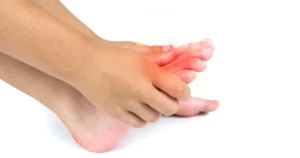
Table of Contents
The discourse surrounding skin conditions has gained prominence in a society progressively embracing variety and promoting body positivity. The emotional impact of skin problems is routinely disregarded, even as societal norms change. Beneath the outward expressions, there is a deep and frequently unsaid battle—people’s emotional journey through a society that occasionally evaluates them based only on the color of their skin.
Millions worldwide suffer from various skin problems, such as vitiligo, psoriasis, acne, and eczema. Yet, the emotional toll they take is frequently underestimated. The mirror becomes a battleground where self-esteem and confidence are challenged daily. It’s not just about what meets the eye; it’s about the internal scars that go unnoticed.
The Weight of Society’s Gaze: Skin Conditions
In a society that places immense value on appearance, those with visible skin conditions often find themselves subject to scrutiny and judgment. Feelings of inferiority and loneliness can result from the intense pressure to live up to traditional notions of beauty. Beyond the individual, relationships, social interactions, and mental health are all impacted by the emotional impact.
Breaking the Stigma:
Addressing the emotional impact of skin conditions requires dismantling the stigma attached to them. It’s about fostering a culture that values people for who they are rather than their appearance. Natural beauty, after all, transcends the surface and delves into the depths of character, resilience, and compassion.
The Journey to Self-Acceptance:
For many individuals with skin conditions, the path to self-acceptance is riddled with challenges. It involves confronting societal expectations, redefining beauty standards, and embracing uniqueness. Interviews with individuals who have embarked on this journey reveal stories of courage, self-discovery, and the transformative power of self-love.
The Role of Media and Representation:
Media has a significant impact on how society views beauty. Promoting various portrayals by the media can aid in developing a more inclusive narrative. Positive self-representation in media conveys a potent message to people with skin conditions: they are seen, respected, and acknowledged.
Empathy in the Beauty Industry:
With its influence on trends and standards, the beauty industry is uniquely positioned to foster change. Brands championing inclusivity and celebrating diverse beauty strive to create a more empathetic space. From foundation shades that cater to all skin tones to advertising campaigns featuring models with visible skin conditions, the beauty industry is slowly but surely evolving.
Educational Initiatives:
Understanding the emotional impact of skin conditions necessitates education. By incorporating information about various skin conditions into school curricula, we can promote empathy and eliminate misconceptions from a young age. Teaching children that differences should be celebrated rather than stigmatized lays the foundation for a more compassionate future.
Support Networks and Mental Health:
The emotional toll of skin conditions often extends to mental health. Establishing support networks, both online and offline, can be a lifeline for individuals grappling with these challenges. Mental health professionals specializing in dermatology can offer valuable guidance, addressing not only the physical symptoms but also the emotional well-being of their patients.
Embracing Diversity: A Call for Empathy and Understanding
As we delve deeper into skin conditions and their emotional impact, it becomes evident that fostering empathy is the key to breaking down the barriers individuals face. It calls for society to recognize each person’s unique beauty, irrespective of their skin’s appearance.
Empathy in Everyday Interactions:
Every interaction is an opportunity to cultivate empathy. Friends, family, colleagues – everyone plays a role in creating an environment where individuals with skin conditions feel seen and valued. Simple acts of kindness, such as refraining from unsolicited advice or judgment, can go a long way. Understanding that everyone is fighting a battle, seen or unseen, is the first step towards a more compassionate society.
Redefining Beauty Standards:
The definition of beauty is changing, so it’s time to update our expectations. Beauty is a kaleidoscope of hues, textures, and narratives rather than a universal concept. Accepting diversity entails understanding the subtleties of life, which includes the various ways our skin expresses itself. We are getting closer to a world where everyone is at ease in their skin the more we embrace their diversity.
The Power of Personal Narratives:
Personal stories have the potential to dismantle stereotypes and humanize the experiences of those with skin conditions. Platforms that amplify these narratives provide a space for individuals to share their triumphs, challenges, and the journey to self-acceptance. By listening to these stories, we gain insights that challenge preconceived notions and inspire a more inclusive mindset.
Advocacy and Activism:
Advocacy plays a pivotal role in driving societal change. Individuals, influencers, and organizations promoting positive body image and mental well-being can be powerful change agents. Campaigns that emphasize the importance of self-love and challenge discriminatory practices contribute to a cultural shift toward acceptance and understanding.
Collaborative Efforts:
Breaking the emotional shackles associated with skin conditions requires collaborative efforts. Medical professionals, psychologists, educators, and policymakers must join forces to create an ecosystem that addresses the physical aspects of skin conditions and those affected’s mental and emotional well-being. It’s a holistic approach that acknowledges the interconnectedness of mind, body, and societal perceptions.
Moving Towards a More Inclusive Future:
The journey towards a more inclusive future is ongoing and requires commitment from individuals and society. It’s about consciously choosing empathy over judgment, rewriting beauty standards, and standing against discrimination. In this journey, we must acknowledge that we are all participants, influencing the narrative through our actions, words, and attitudes.
Conclusion:
The emotional toll that skin conditions take is a story that goes beyond the surface and needs consideration and compassion. It’s about encouraging an accepting culture, accepting diversity, and questioning conventional wisdom. At Integrity Foot And Ankle Associates, we don’t just treat skin conditions; we walk with you on your path to optimal foot and ankle health. Trust us to provide personalized, patient-centric care backed by cutting-edge technology because your journey to happy, healthy feet begins with integrity. Are you prepared to enter a place of ease and self-assurance? Make an appointment right now with Integrity Foot and Ankle Associates. Allow our knowledgeable podiatrists to lead you on a customized journey to relieve skin ailments and restore your zest for life.




